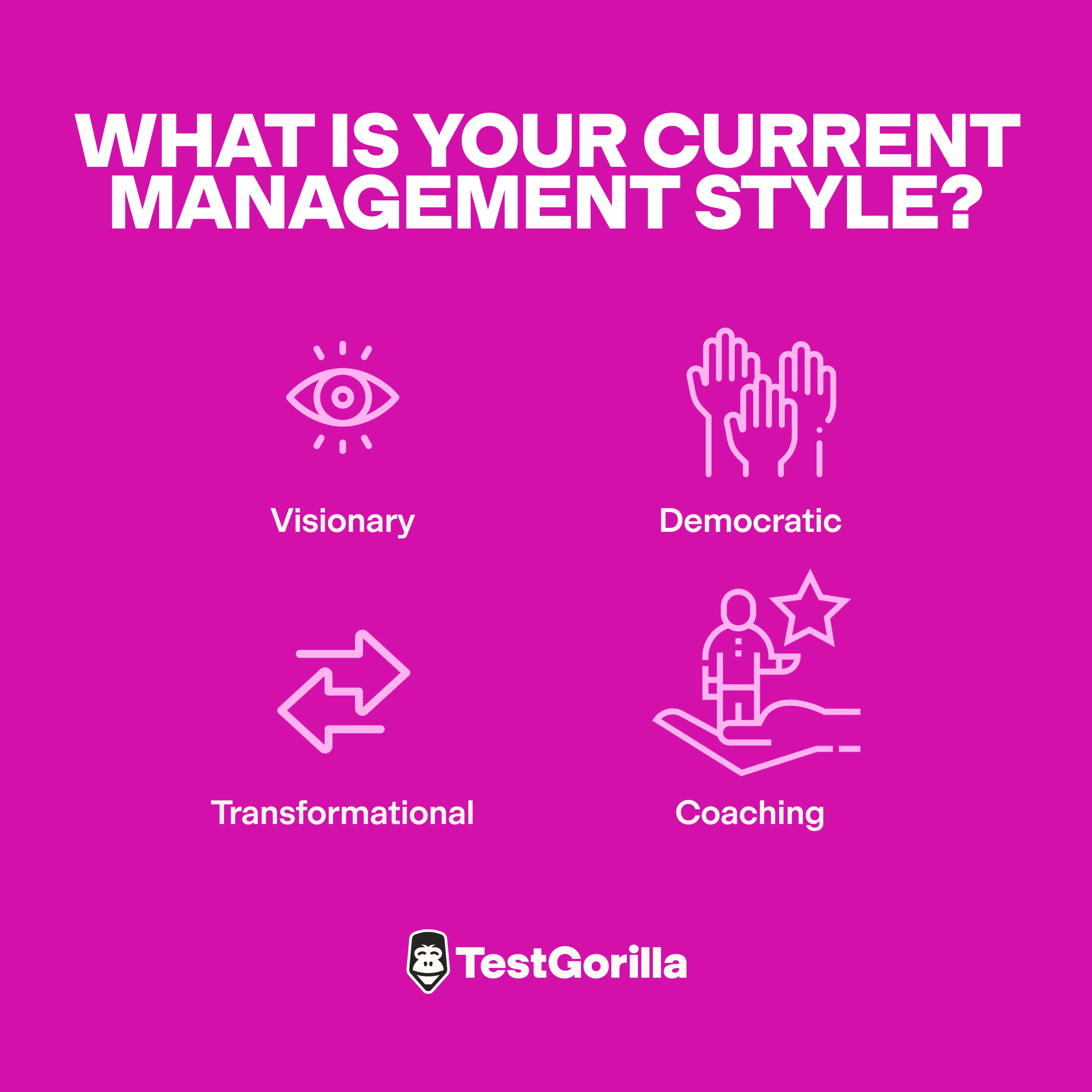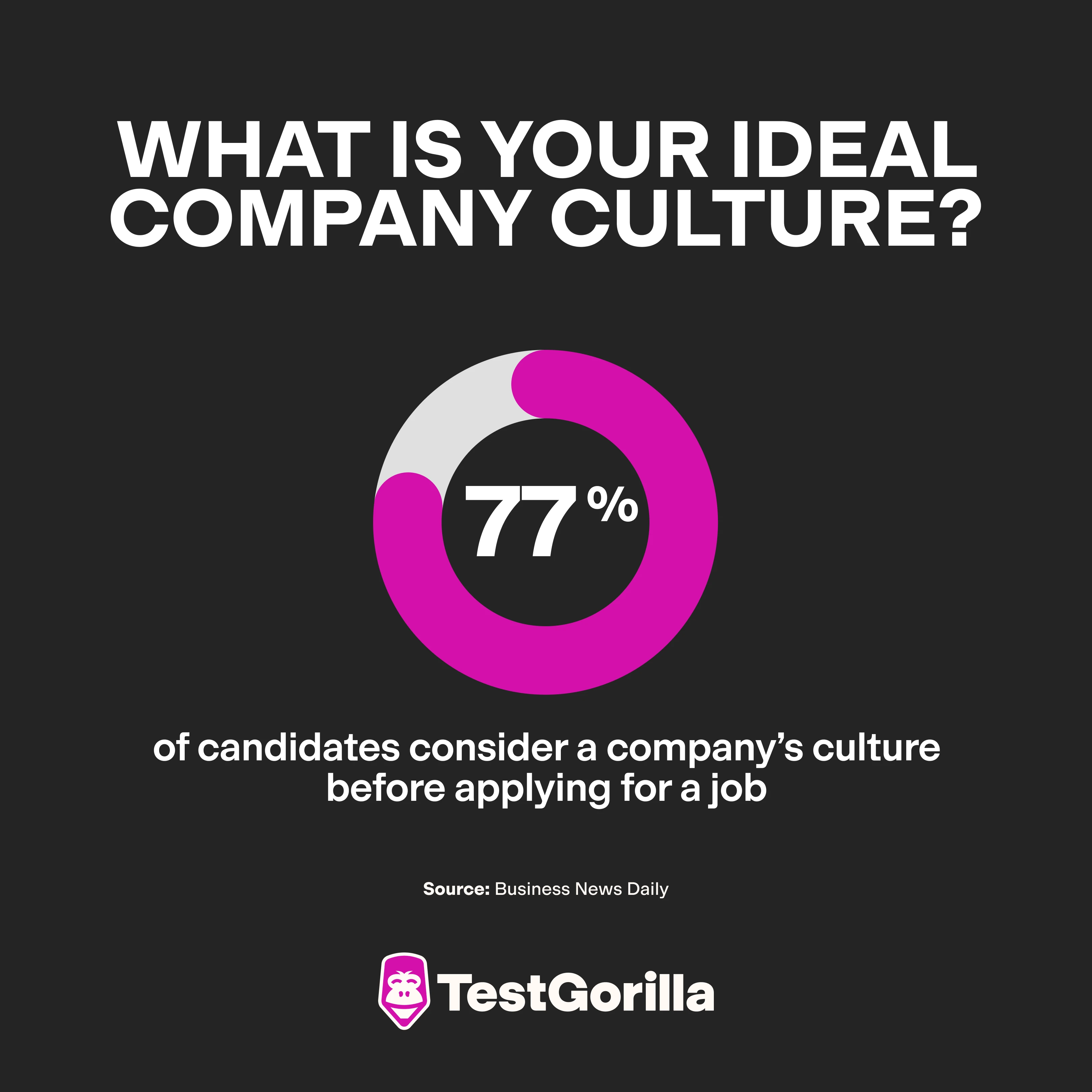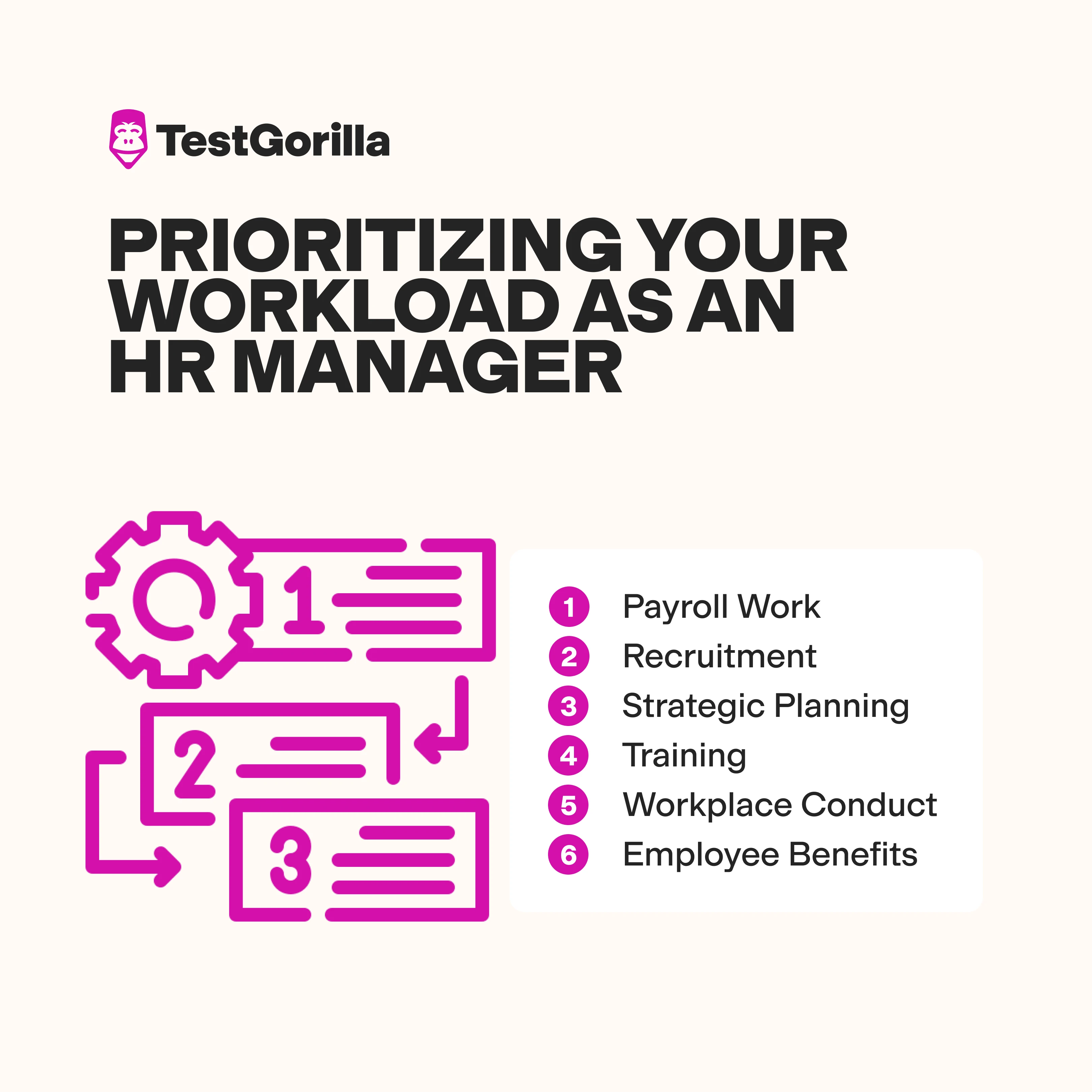20 HR manager interview questions to ask skilled professionals
HR managers contribute significantly to your company. And not just the recruiting department: They plan and coordinate administrative functions while managing the onboarding process. To ensure your company doesn’t lag behind in a competitive market, you may need to hire a professional who can handle these responsibilities and take your business to the next level.
Before conducting an interview, you should send your candidates an HR Fundamentals test as part of a more comprehensive skills assessment. With this method, you can better understand their skills, knowledge, and experience.
But to identify suitable talent, you should also ask relevant questions that your candidates will find interesting, challenging, and engaging. Potential HR managers should be excited to work for your company.
To inspire your applicants and engage them in the conversation, read through our list of 20 HR manager interview questions.
20 HR manager interview questions to help you find talented professionals
Below are 20 HR manager interview questions and answers that cover work experience, culture fit, personality, behavior, current skills, and knowledge of human resources.
1. What do you like most about working in human resources?
Candidates should express their passion for working in a human resources department. They may discuss past work experiences that helped them develop their skills or prominent figures that inspired them. Each answer will be unique, so focus on the candidate’s ability to communicate and express their thoughts.
You could send candidates a 16 Types Personality test before the interview. This test will help you better understand your candidates’:
Aspirations
Abilities
Challenges
Depending on the answers, you can choose a candidate that matches your company’s culture and has the right mindset for HR management.
2. Tell me about your preferred system for talent management.
A variety of talent management systems can help attract, onboard, develop, organize, and retain skilled employees. HR managers should know what system works best and how they would use it to enhance the hiring process. They might give examples of popular software programs or recruiting strategies that foster personal development opportunities.
3. How do you measure employee performance?
Research suggests that 73% of employees think about quitting their jobs because they don’t feel engaged or appreciated. This outcome can be detrimental to a company, especially if skilled employees find another position.
For an HR manager, it’s important to recognize employee performance and offer support when necessary. Candidates should talk you through the steps of measuring productivity levels and how they would provide specific training programs for further development.
Use an HR Management test to learn if candidates can benefit employee productivity and create training programs. This test also evaluates their leadership, communication, organization, and teamwork skills.
4. Talk me through your ideal onboarding process.
The onboarding process is a key part of recruitment. Candidates should already know this if they have experience working in the human resources department. There is no right or wrong answer, but you should make a note of the individual’s management style and thinking process.
For example, some candidates might focus more on preboarding by arranging welcome packages and sending regular emails. Others could zone in on HR paperwork to complete legal information beforehand.
5. What technology will change human resources in the next five years?
Candidates should keep up to date with technological advancements. They should understand that the HR industry uses hardware and software systems to drive successful companies. Without the right technology, payroll and virtual recruitment become challenging.
The ideal candidate will give examples of recent technological developments and how they might shape human resources and HR manager roles.
6. What is your current management style?
Consider asking candidates about their management skills and style. A management style refers to how a manager achieves goals and drives others to success. This question is important if you want to hire someone with great knowledge and ideas.
Some management styles include:
Visionary: This type of HR manager has a vision and purpose when it comes to driving employees. They often create long-term goals for the company and present creative ideas to the team.
Democratic: HR managers value the decision-making process when following this management style. All employees can contribute to big decisions, enabling them to put their top skills to the test.
Transformational: For this style, managers always strive for more by seeking continuous improvement. They encourage employees to better themselves and learn new skills in a demanding industry.
Coaching: An HR manager who uses this style aims to motivate others and make employees focus on personal development. They frequently teach employees new skills and techniques for completing tasks.
7. How many years of experience do you have in HR?
Not all candidates will have many years of experience, but it’s still worth learning about their HR or general employment background. The ideal candidate may have gained experience from several jobs that focused on administration and recruitment.
However, you should always allow candidates to explain their personal development goals. Even if a candidate has over three years of experience in recruitment, it doesn’t necessarily mean they will suit an HR manager role in your company.
8. Explain how you would lead a hiring team in our company.
According to Gallup, 82% of companies fail to hire the right candidate. This research suggests that many companies fill leadership positions with people who don’t have the right skills and experience. Not having a capable HR manager will increase the risk of your company getting things wrong, which may lead to lower employee satisfaction levels.
To prevent falling into that 82%, you should ask this question in every interview. Candidates may explain how they:
Lead a team
Enforce strong HR management
Use particular leadership styles in specific environments.
If the candidate gets stuck, they may not be a suitable fit.
Send candidates a Leadership & People Management test before their interviews. This test determines their ability to guide others and delegate tasks to team members. You may use this as part of an assessment to learn if candidates can unite teams and delegate tasks effectively when finding potential leaders.
9. Do you have much knowledge of HR software systems?
Candidates with technical knowledge may be more suitable for an HR manager role. They know how to:
Navigate software for payroll duties
Handle talent management
Complete virtual interviewing
Communicate with digital technology
An HR software system should optimize resources and profits. Managers can use them to support employees and other team members. If your candidate names a few examples, they most likely have good personal experience.
Consider using a Microsoft Excel test to evaluate a candidate’s technical skills. You can see how they interpret basic information and create reports based on data. The Xero test is another test that focuses on processing transactions like payroll and bookkeeping services for the company.
10. How would you deal with conflict between team members or employees?
Conflict is bound to happen in any job, especially if team members are passionate about their work. Understanding how to solve disagreements can enhance a positive company culture, so HR managers must try to reinforce peace.
For example, one candidate might arrange a private meeting with team members to discuss their feelings and suggest a compromise where both parties are happy. Other candidates could focus on their active listening skills to ensure all employees are heard and respected.
Sending candidates a Problem-Solving test can help you better understand their mindset. The ideal candidate breaks down conflict into manageable parts and takes the right steps to execute a plan. In this test, candidates can also use their analytical skills to solve general problems in the workplace, such as messy schedules, incorrect payroll, or allegations of sexual harassment.
11. What is your ideal company culture?
Recent studies have proven that 77% of candidates consider a company’s culture before applying for a job. They won’t apply for specific positions if the company doesn’t value employees or provide continuous recognition. A potential HR manager should be aware of this fact, especially if they want to change your company’s culture in a positive way.
The ideal candidate will describe a productive working environment that suits their goals and morals.
Before the interview, use a Culture Add test to determine whether the candidate’s expectations align with your company’s values. In this test, candidates will explain their idea of a strong organizational culture and how they want to make employees feel appreciated and welcome.
12. Have you ever deviated from company policy to solve a problem?
Sometimes, HR managers have to solve problems that force them to stray away from standard workplace conduct. This process isn’t always flawed, especially if the manager achieves a positive outcome. Candidates may or may not have experience doing something like this, but they can still provide a realistic example of how they might deviate from a specific policy in specific situations.
Such a situation could be related to employee health and safety. For example, a company may require all computer systems to be on and available at all times. However, if there were an electrical accident that harms an employee, the HR manager must go against the policy and shut off all equipment.
You can send candidates a Critical Thinking test to see how they respond in certain situations. Each candidate has the chance to make sound judgments and use logic to identify the correct answer. This test is crucial for HR managers who create company policies and procedures.
13. What would be the first employee policy you create in this company?
Leading on from the previous question, you can determine what the candidate cares about most in the workplace. They might focus on time-off benefits to ensure all employees have a good work-life balance. Or they may discuss attendance and punctuality, which ensures a company functions efficiently.
All candidates will have a unique opinion, so it’s better to note down their answers and determine which candidate suits your company’s requirements and future goals.
14. How would you welcome a new employee?
HR management is usually responsible for the onboarding process. They welcome new employees and send them relevant information before starting. A potential candidate should describe their method of welcoming new employees and helping them feel comfortable on their first day.
For example, they might arrange a social event to make the employee more comfortable or add them to a group chat where other employees share tips. Always note down their responses to compare with other candidates’ answers after the interview.
Send candidates a Big 5 (OCEAN) Personality test to evaluate their openness, conscientiousness, extroversion, agreeableness, and emotional stability in the workplace. Learning more about a candidate’s personality can help you determine whether they’re suitable for an HR management role.
15. What qualities do you look for in a new hire?
Since HR managers focus on talent management, they must be aware of relevant skills and knowledge in the current industry. It’s important to hire the right candidate, especially for demanding roles that require consistent work.
Research suggests that 76% of managers admit to making a bad hire. This can negatively impact the business financially and in terms of time, as managers must train replacements. HR manager candidates should demonstrate awareness of the costs that can rack up and describe their processes of locating skilled talent.
16. Share some employee benefits you would implement in our company. How would they drive retention and satisfaction?
Employee benefits and recognition programs can enhance a company’s culture. The ideal candidate may have ideas about what they want to create in an HR manager role. For example, they might extend paid time off for employees who want to improve their mental health.
Another great benefit is flexible working schedules, especially for pregnant women or single parents. You should choose a candidate who could make a positive difference in your company.
17. How do you prioritize your workload as an HR manager?
It’s a common fact that HR management is demanding. An HR manager has various duties, including:
Payroll work
Recruitment
Strategic planning
Training
Workplace conduct
Employee benefits
They work to ensure the company is thriving in an evolving competitive market.
Therefore, candidates should know how to manage their tasks and create sustainable schedules. Ask them this question to learn more about their time-management skills and how they stay on top of heavy workloads.
Did you know that employees complete 26% of work outside of office hours? This often occurs due to poor time management, leading to burnout and an unrealistic work-life balance.
To avoid hiring the wrong candidate, use a Time Management skills test to understand how they plan and execute specific tasks.
18. What unique skills can you bring to our human resources team?
To grow your company, you must hire candidates with unique skills, knowledge, or work experiences. You don’t want a group of employees who do exactly the same thing, as this kind of team won’t contribute much to long-term success. According to research, diverse teams make better decisions 66% of the time.
You should learn more about the candidate’s personality and how they can bring handy skills to the human resources department.
You can send all candidates a Motivation test for more insight into their mindsets. This test focuses on their core personality traits and unique skills when it comes to HR management.
19. How can you help our company grow while maintaining diversity?
HR managers usually focus on diversity and inclusion. These two factors can help enhance a company’s culture and strengthen teams. The ideal candidate will provide examples of how they will maintain diversity while giving everyone fair opportunities.
For instance, they might support communities and affinity groups or improve the onboarding process by emphasizing diversity, equity, and inclusion to job applicants.
20. How do you handle job terminations?
Termination of employment is never easy, but HR managers should know how to deal with this procedure. Candidates may have experience with job termination, depending on their work history. However, it’s not a problem if some candidates have never been involved in a process of layoffs or dismissals. They can still give an example of how they would handle an employee’s departure.
At which stage of the hiring process should you use HR manager interview questions?
You should use HR manager interview questions after sending candidates skills assessments. This technique can help you identify skilled talent during the hiring process.
For example, you could send each candidate a Google Docs test to determine their knowledge of document customization and software design. Other relevant options such as our Financial Math test are especially important for HR managers who administer payroll and change salaries.
Once the candidates have completed each test in the assessment, you can compare their responses. Using these data-driven results ensures you’re interviewing job applicants who have experience or core skills in HR management.
The best insights on HR and recruitment, delivered to your inbox.
Biweekly updates. No spam. Unsubscribe any time.
Use these HR manager interview questions and TestGorilla’s skill assessments to identify top talent
TestGorilla has an extensive test library containing skills assessments. You can search for various skills tests that cover programming, language, cognitive ability, situational judgment, software, and personality.
To hire the best HR manager, make sure to use our list of interview questions after shortlisting candidates with the relevant skills You can learn more about their work experience and prominent personality traits to determine whether they’re suitable for the role.
Create a free account with TestGorilla to access comprehensive skills assessments and locate top talent for your company.
Related posts
You've scrolled this far
Why not try TestGorilla for free, and see what happens when you put skills first.

















